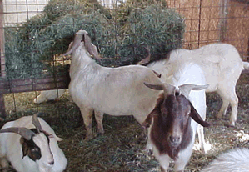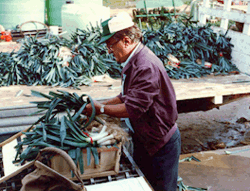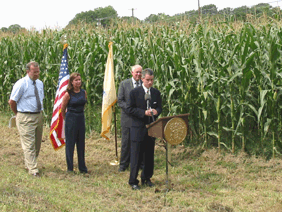|
Goal 1: Preserve Farms
Permanently preserve and retain the maximum amount of New
Jersey farmland to maintain a  viable agriculture and food
industry, and promote smart growth and a high quality of
life for New Jersey citizens. viable agriculture and food
industry, and promote smart growth and a high quality of
life for New Jersey citizens.
- The Department formed an internal Smart Growth
Working Group to coordinate smart-growth efforts across
program areas and develop an Agricultural Smart Growth Plan.
The plan will identify target areas in the state for
agricultural retention, identify economic development
activities needed to sustain the industry, and recommend
planning techniques that equitably preserve contiguous
farmland. The State Agriculture Development Committee
(SADC), which administers the Farmland Preservation Program,
initiated a statewide strategic targeting project to
identify areas of prime farmland under the threat of
development. The project, which is being conducted in
conjunction with county and municipal planning efforts, is
the first strategic planning project in the program's
history.
- New Jersey surpassed the 100,000-acre mark for
preserved farmland under the state Farmland Preservation
Program. New Jersey has preserved 12 percent of its
available farmland - ranking it first among all other states
in the preservation of available land base. At year's end,
796 farms totaling 100,145 acres were permanently preserved
statewide.
- A total of 161 farms covering 13,154 acres were
permanently preserved during 2002 - 35 more farms than the
program's previous record high.
- The SADC continued to expand its Direct Easement
Purchase Program, through which the state directly purchases
development rights from landowners to preserve their farms.
Forty-two farms were permanently preserved under this
program - a more than 250 percent increase over 2001 totals.
- Nine farms were permanently preserved under the
SADC's fee simple program. This program is critical in
saving farms most in jeopardy of development - those whose
owners are looking to sell. Under this program, the SADC
purchases farms outright, then resells them at public
auctions with deed restrictions that permanently preserve
the land for agricultural use. In addition to ensuring
permanent preservation of the land, this program also helps
make farmland available for purchase by other farmers at
more affordable prices.
- As part of efforts to strengthen communication, the
SADC formed a task force with the Department of
Environmental Protection's Green Acres Program to coordinate
farmland and open space preservation efforts. It also held a
series of outreach meetings in various parts of the state to
discuss with farmers and local governmental officials
advances in the Right-to-Farm and Farmland Preservation
programs.
- The SADC streamlined its closing process to
preserve farms at an accelerated pace. Farms under the fee
simple program closed in an average of six months from the
date of contract, while direct easement purchase
applications were closed in an average of nine months from
the date of agreement.
- State farmland preservation funds were bolstered by
a $2,303,600 grant for farmland preservation from the U.S.
Department of Agriculture Federal Farmland Protection
Program.
- Legislation was enacted in early 2002 to protect
historic structures on permanently preserved farms. Historic
structures on any farms preserved on or after January 8,
2003, may not be demolished without the permission of the
SADC. In addition, the legislation enables the SADC to give
priority for preservation to farms that have historic
structures.
- The New Jersey Supreme Court recognized New
Jersey's Right to Farm Act as the strongest in the nation,
ruling in a case involving a dispute between a greenhouse
operator and Franklin Township, Hunterdon County. The court
held that the Right to Farm Act preempts municipal land use
authority over commercial farms. The court ruled that county
agricultural development boards and the SADC have primary
jurisdiction over disputes between municipalities and
commercial farms, but noted the boards must give appropriate
consideration to local ordinances and regulations, and
consider the impact of agricultural management practices on
public health and safety.
- The SADC adopted agricultural management practices
for the installation of fencing and for on-farm composting
operations. Farmers who conform with agricultural management
practices that have been adopted by the SADC or are
considered to be generally accepted are afforded greater
protection under the Right to Farm Act. The SADC also formed
a subcommittee consisting of federal, state and local
officials, and agricultural and environmental interests, to
review impervious coverage on preserved farmland.

Goal 2: Protect and Conserve Natural and Agricultural
Resources
Encourage and support stewardship of agricultural and urban
open land and other natural resources to protect and enhance
fertile soils, clean water, and productive and healthy
animal and plant resources.

- The Asian longhorned beetle - a foreign pest that
attacks and kills maples and other hardwood trees - was
detected for the first time in New Jersey in October in
Jersey City, Hudson County. The Department instituted an
emergency quarantine of the site and the surrounding area
within a 1-1/2 mile radius to prevent the beetle's spread. A
total of 102 trees within the core area are infested. A
joint state and federal work plan for beetle eradication is
being developed.
- Aerial treatments were carried out on 24,563 acres
in 33 forested residential communities throughout the state
to protect against heavy defoliation by gypsy moth. Gypsy
moths defoliated 41,750 acres of forested lands in 15
counties and 53 municipalities - a 70 percent decrease from
2001. Lower gypsy moth population levels in the state can be
attributed to a successful spray program and increased
fungus and other parasites in the northwestern counties of
the state.
- Two species of Galerucella leaf-feeding beetles
were produced and released by Department scientists to
combat purple loosestrife. Purple loosestrife is an invasive
freshwater wetlands plant, originally from Europe, which is
displacing native plants in the state's marshes and
threatening animals that depend on those native plants for
food and shelter. An estimated 70,700 beetles were released
at 10 sites in six counties: Bergen, Burlington, Middlesex,
Monmouth, Morris and Sussex. The Department noted dramatic
reductions in purple loosestrife levels at several locations
where native plants once again are reclaiming territory.
- A total of 47 cases of West Nile Virus (WNV) in New
Jersey equine were confirmed by the end of October - an
increase over 2001 when a total of 30 equine tested positive
for the disease. The virus continued to spread across the
United States, with 14,717 equine WNV cases reported in 40
states. The Department recommends eliminating mosquito-
friendly environments on farms; vaccinating horses against
WNV and other mosquito transmitted diseases such as Eastern
equine encephalitis; reducing the exposure of horses to
mosquitoes by keeping them indoors from dusk until dawn, and
judiciously using insecticide spray. None of the horses
diagnosed with clinical WNV disease this year had been
vaccinated against the disease.

- The Department worked to develop humane standards
of care for livestock, including cattle, horses, swine,
small ruminants, poultry and rabbits. The standards are
expected to be publicly proposed in the New Jersey Register
early in 2003. They are being developed in cooperation with
representatives from the Society for the Prevention of
Cruelty to Animals (SPCA), Rutgers University's Cook
College, the New Jersey Veterinary Medical Association and
the livestock industry.
- Through continuing programs carried out in
cooperation with the NRCS:
- conservation plans were developed for 35,191 acres
of farmland;
- erosion control practices were installed on more
than 17,861 acres of land, which prevented the loss of
137,811 tons of productive soil;
- conservation tillage techniques were used on almost
4,253 acres of farmland to reduce soil loss and protect
water quality; and
- conservation practices, including conservation
buffers and other land management practices, were installed
on nearly 27,000.
- As part of efforts to protect water quality, the
Departments of Agriculture and Environmental Protection
developed a proposal for New Jersey to participate in the
Conservation Reserve Enhancement Program (CREP). If approved
by the U.S. Department of Agriculture, the proposal would
enable New Jersey farmers to access $70 million in federal
funds to establish buffers and implement other water quality
improvement practices on farms.
Goal 3: Protect Producers and Consumers by Ensuring Safe,
High-Quality Agricultural Products and Services
Administer fair and effective regulatory, inspection,
grading and other quality assurance programs for food,
agricultural products and agricultural inputs.
- The Department in October issued its first
certificate for food safety under the U.S. Department of
Agriculture's new third-party audit program for packers,
producers and retailers of fresh fruits and vegetables. The
USDA's Federal-State Audit Program was modeled after a
program developed by New Jersey. This voluntary food safety
program provides important quality assurances to regional
buyers, national buyers and consumers that participating
producers are following good agricultural and handling
practices.
- To help ensure that ornamental plants purchased by
consumers are healthy and pest-free, the Department
inspected more than 16,000 acres of nursery stock in 866
nurseries, and certified 648 garden centers and landscape
firms as plant dealers.
- As part of a regional coordinated effort to break
the cycle of Avian Influenza in live-bird markets, New
Jersey's live-bird markets were closed for three days in
April while the sites were cleaned and disinfected. While
this disease does not pose a human health risk, the danger
with Avian Influenza is that it could mutate into a high
pathogen disease that kills the majority of infected birds.
This would result in foreign markets embargoing U.S.
poultry. One third of U.S. poultry is exported.
- A total of 9,294 retail stores and 225 milk dealers
were licensed to sell milk, and approximately 1,800
inspections were conducted, as part of the Department's
efforts to ensure compliance with milk control laws and
regulations, and prevent unfair, disruptive trade practices
that could adversely affect consumers and producers.
 |
|
- A total of 159 million pounds of product were
packed under the Jersey Fresh Quality Grading Program. This
program is designed to increase the sales of agricultural
products - including fruits, vegetables, salad mixes, fresh
herbs, shell eggs and cut flowers - by providing quality
assurance for wholesale produce buyers and consumers. After
registering under this program, growers are permitted to use
the Jersey Fresh logo on their packages, indicating that the
contents have been inspected and meet certain quality
standards.
|
- To ensure that feed, fertilizer and lime sold in
the state are accurately labeled and are free from
contaminants, the Department collected and analyzed nearly
1,200 random samples. Eight percent of feed samples, 15
percent of fertilizer and 7 percent of lime samples failed
this testing. Warnings or penalties were issued depending on
the severity of the violations. Penalties for deficient
fertilizers are returned to farmers to offset losses that
may have been caused by the lower-quality product.
- Brucellosis is a contagious and costly bacterial
disease of swine that causes abortion, infertility, partial
paralysis of the hindquarters and lameness. Brucellosis is
also a public health concern as the disease can be
transmitted to humans. On February 22, swine brucellosis was
confirmed at a hog farm in Cape May County. Under Department
supervision, the farm underwent complete depopulation, was
cleaned and disinfected, and remained free of swine for 30
days. In addition, the Department instituted an area test of
all breeding swine in Cape May County and parts of Atlantic
and Cumberland counties to determine the scope of the
outbreak. The hog farm in Cape May County was the only one
affected by the outbreak.
- The Food and Drug Administration awarded the
Department a contract to perform inspections in small feed
mills in New Jersey for bovine spongiform encephalopathy
(BSE) rule compliance. The BSE rule was developed in 1997 to
prevent meat and bone meal derived from ruminants from being
used as feed ingredients for cattle, sheep, goats and other
ruminants. This safeguard represents one more way to prevent
BSE - or Mad Cow disease - from developing in the United
States.
Goal 4: Support and Expand Profitable, Innovative
Agricultural and Food Industry Development
Foster agricultural economic growth, profitability and a
positive business climate through technical and financial
assistance, market development, and effective product and
industry promotion.
- The Department's efforts to encourage and support
New Jersey's emerging aquaculture industry included:
- working with the Department of Environmental
Protection to make available 25,000 Delaware Bay acres and
2,500 Atlantic coastal acres for aquaculture;
- developing aquaculture management practices that
focus on erosion control, storm water management and water
quality to help maintain and protect the state's soil and
water resources while averting a cumbersome regulatory
process for aquatic farmers;
- developing an Aquatic Organism Health Management
Plan to protect aquatic farmers, wild stocks and the
environment from the introduction of pests and diseases that
could destroy product and have a negative impact on
operations; and
- developing a trade-lead database and dissemination
program that provides New Jersey companies with ready access
to leads around the world.
Export sales increased by $2 million as a result of the
widespread availability of trade leads, the Department's
participation in trade shows and missions, and increased
efforts to promote the state as a major producer of high-
quality seafood.
- As part of efforts to support and encourage organic
farming, the Department:
- drafted legislation, rules and regulations that
would establish a state organic program in accordance with
new federal organic regulations. The program would provide
farmers who are transitioning to organic production, and are
in the process of completing the three-year qualifying
period, the ability to market their products as
transitional;
- actively marketed New Jersey organic products as
part of the Jersey Fresh campaign at trade shows and
meetings, including the Toronto Grocery Showcase and the
Canadian Produce Marketing Association's annual event;
- developed a Jersey Organic logo for use in the
Jersey Fresh program starting in the 2003 growing season;
and
- under a cooperative agreement with the U.S.
Department of Agriculture's Agricultural Marketing Service,
administered a program that provided cost-share funding to
reimburse organic growers for up to 70 percent of their
certification costs, not to exceed $500. During the first
two phases of this program, the Department reimbursed a
total of $9,786 to 47 certified organic growers.
- Governor McGreevey in August announced support for
plans to site an ethanol plant in South Jersey, which would
create a major new market for the state's grain growers.
 Garden State Ethanol, a private corporation of farmers,
investors and other agricultural interests, seeks to build
the first ethanol production facility in the Mid-Atlantic
region. It would process about 14.2 million bushels of corn
annually to produce 40 million gallons of ethanol that would
be sold as an environmentally friendly ingredient for
gasoline. New Jersey farmers currently grow nearly 10
million bushels of field corn annually. Much of it is
shipped out of state to markets in Pennsylvania or Delaware
for use as cattle or chicken feed. An ethanol production
facility would encourage New Jersey farmers to plant
additional fields in corn or sorghum - an alternative grain
that the plant will be able to utilize. Garden State Ethanol, a private corporation of farmers,
investors and other agricultural interests, seeks to build
the first ethanol production facility in the Mid-Atlantic
region. It would process about 14.2 million bushels of corn
annually to produce 40 million gallons of ethanol that would
be sold as an environmentally friendly ingredient for
gasoline. New Jersey farmers currently grow nearly 10
million bushels of field corn annually. Much of it is
shipped out of state to markets in Pennsylvania or Delaware
for use as cattle or chicken feed. An ethanol production
facility would encourage New Jersey farmers to plant
additional fields in corn or sorghum - an alternative grain
that the plant will be able to utilize.
- The Department coordinated with the federal Farm
Service Agency in obtaining a U.S. Secretary of Agriculture
emergency drought declaration. That declaration makes New
Jersey farmers who suffered significant crop losses eligible
for low-interest federal loans and credit programs, as well
as payments through the federal Livestock Compensation
Program.
- The Departments of Agriculture and Corrections
worked with state Treasury officials to develop a waiver
under the state produce contract that allows Corrections to
take advantage of seasonal market conditions by making
targeted purchases of New Jersey-grown fruits and vegetables
when prices are low. This was expected to enable Corrections
to buy an estimated one million additional pounds of New
Jersey produce, providing a new market for New Jersey
farmers, reducing state costs and offering more nutritious
fruits and vegetables throughout the correctional system.
- The Department developed a Jersey Fresh website
(www.jerseyfresh.nj.gov) to help consumers locate pick-your-own farms, roadside markets, and agricultural fairs and
festivals, as well as provide recipes and other information
to encourage the purchase of New Jersey-grown products.
- Through the Jersey Fresh Matched Funds Program, the
Department awarded $320,345 in state grants to 91 New Jersey
agricultural organizations to fund specialized promotions
under the Jersey Fresh banner. The grants yielded more than
$650,000 worth of additional Jersey Fresh exposure.
- The U.S. Department of Agriculture in October
awarded $390,200 in grants for five New Jersey value-added
agricultural market development projects. Value-added
projects increase the value of raw agricultural products by
refining them in some way, for example, through processing
or packaging. The grants included $219,000 to Garden State
Ethanol to conduct a feasibility study and develop a
business plan for an ethanol production plant, and $107,000
to the Sussex County Milk Producers in Lafayette to conduct
a feasibility analysis and develop a business plan for
producing Jersey Fresh value-added dairy products, including
a Jersey Fresh milk brand.
- To expand available lands for agriculture, the
Department worked with the Department of Environmental
Protection to reopen agricultural lands in the Six Mile Run
area of Somerset County and other state-owned lands for
leasing to farmers.
- Department staff provided oversight necessary for
21 New Jersey growers to participate in the Canadian
Blueberry Certification Program and export their fresh
blueberries to Canada. In 2002, 18 New Jersey growers
shipped more than 514,000 flats of fresh blueberries to
Canada - a 29 percent increase over the previous year.
- Governor McGreevey signed legislation that allows
foals to be eligible to participate in the New Jersey Sire
Stakes Program if they were born to mares that had been
artificially inseminated with transported semen from
registered New Jersey stallions. This removed the
restriction that a mare had to actually be bred in New
Jersey for the resulting foal to be eligible for the New
Jersey Sire Stakes. This legislation is critical to helping
New Jersey retain and attract quality stallions; enhance the
purse structure of the New Jersey Sire Stakes Program;
enable the New Jersey breeding industry to better compete
with surrounding states, and help New Jersey retain its
equine farms.
- The Department provided direct technical assistance
to nearly 2,000 individuals on business and agricultural
economic development, agricultural credit and finance,
farmland assessment, motor vehicle requirements,
agricultural labor, sales and use tax, specialized farm
production, real property taxes, and sales and use tax.
Nearly 30 new and beginning farmers were provided guidance
in securing credit for almost $7 million in real property
acquisitions and improvements.
Goal 5: Provide Access to Fresh and Nutritious Foods for
Children, the Needy and Other New Jersey Citizens
Implement food and nutrition assistance programs to maximize
participation by eligible New Jersey citizens, and
strengthen agriculture's relationship with the food
industry.
- More than 37.8 million pounds of U.S. Department of
Agriculture-donated commodities were distributed to more
than 500,000 New Jersey schoolchildren under the National
School Lunch Program and to more than 250,000 needy families
through 650 food pantries and soup kitchens throughout the
state under The Emergency Food Assistance Program.
- Under a joint state and federal program to improve
the nutritional diets of schoolchildren, the Department
increased its purchases of fresh fruits and vegetables from
$400,000 in the previous school year to $1.6 million for the
2002-2003 school year. This effort included ordering more
than 10,000 cases of locally grown Jersey Fresh produce in
season.
- The Legislature in December passed a bill requiring
schools to offer a school breakfast program if 20 percent or
more of their students are eligible for free or reduced-
price meals under federal guidelines. The bill requires
affected schools with grades K-6 to submit a plan to the
Department of Agriculture for starting a school breakfast
program by November 2003 and requires implementation of the
program by September 2004. All other affected schools must
submit a plan by November 2004 and implement the program by
September 2005. The Department will provide technical
assistance and model plans to these schools.
- Under the federal School Breakfast and Lunch
Programs administered by the Department:
- 1,145 schools currently offer the School Breakfast
Program;
- 2,656 schools offer the School Lunch Program;
- average daily participation in the School Breakfast
Program is 87,838 students (6 percent of total
enrollment);
- average daily participation in the School Lunch
Program is 579,272 students (37 percent of total
enrollment);
- approximately 15 percent of students who
participate in the School Lunch Program also participate in
the School Breakfast Program.
- The Department conducted 79 training sessions for
school food service personnel and child nutrition sponsors
to assist them in streamlining program operations and
improving the quality of meals offered.
 A total of 49 community farmers markets operated
during 2002, with more than 160 farmers participating. These
markets provide an important source of fresh fruit and
vegetables, particularly for thousands of nutritionally-at-
risk children, women and senior citizens. At the same time,
they offer farmers another market for their products. A total of 49 community farmers markets operated
during 2002, with more than 160 farmers participating. These
markets provide an important source of fresh fruit and
vegetables, particularly for thousands of nutritionally-at-
risk children, women and senior citizens. At the same time,
they offer farmers another market for their products.
- More than $650,000 was issued to 32,493 pregnant
and nursing women and children ages 3 to 5 enrolled in the
WIC (Women, Infants and Child) / Farmers Market Nutrition
Program. An additional $482,000 was issued to 24,100 senior
citizens under the Senior Market Nutrition Program. These
federal and state funded programs - administered jointly by
the Departments of Agriculture and Health and Senior
Services - provides participants with vouchers they can use
to purchase fresh fruits and vegetables at community farmers
markets.
Goal 6: Promote Agricultural Education, Awareness and
Involvement
Ensure the sustainability of New Jersey's agricultural
industry through agricultural education, youth development,
training opportunities, and successful communication with
the agricultural community, general public and all levels of
government.
- More than 150 students from 28 high schools across
the state competed in the New Jersey Envirothon, a natural-
resource problem-solving competition coordinated by the
Department. Throughout the school year, students prepared
for the event by studying natural-resource related topics,
including soils, forestry, aquatics and wildlife ecology.
The Envirothon held in May tested their knowledge in these
areas through interactive problem-solving.
- To assist farmers in understanding available
assistance in reducing agricultural risks, the Department
conducted a farm risk management and crop insurance
education and information program in partnership with the
U.S. Department of Agriculture' s Risk Management Agency and
Rutgers Cooperative Extension. In 2001, on average for each
dollar farmers paid in premiums for crop insurance coverage,
$1.88 was paid out to cover losses incurred by New Jersey
farmers.
- Two dozen farmers and other members of the
agricultural community received training through the 2002
New Jersey Agricultural Leadership Development Program, a
collaborative effort of the New Jersey Agricultural Society,
the Department of Agriculture, Farm Bureau and Rutgers
Cooperative Extension. Members of the class studied local,
state and federal government issues during a two-day session
in Trenton and a four-day study session in Washington, D.C.
Participants also devoted several days to discussions
regarding land use, natural resources and social issues. The
goal of the program is to provide participants with the
skills and knowledge to make better decisions for
themselves, their operations, the food and agricultural
industry, and their communities.
- To help protect the public and livestock from
disease, the Department developed a series of six posters
for posting at petting zoos, fairs and shows, and other
livestock venues. The posters educate the public about the
potential for disease transmission between humans and
animals, and promote the importance of hand-washing before
and after touching animals. Contact between humans and
animals, especially at petting zoos and livestock venues,
has been implicated in E. coli disease outbreaks. The
Department, in consultation with the Department of Health
and Senior Services, also developed guidelines for use at
fairs and shows. The guidelines and posters were mailed to
fair and show managers throughout the state and to each
county extension office.
 |
- The Department provided leadership, resources and
services to support food, agriculture and environmental
science education programs for more than 2,000 secondary-
school students in 44 school districts. These efforts
included two dozen career development events for 600
students; leadership and public speaking development events
at four statewide conferences; offering professional
development credits for teachers in agricultural related
topics, and coordination of the state-level FFA, which has
35 chapters in New Jersey.
|
 |
Goal 7: Guarantee the Delivery of Quality Services by a
Well-Trained and Motivated Workforce
Produce quality in all we do through a diverse, effectively
managed, highly trained and committed staff supported by
efficient use of available technology and resources in a
work environment that fosters excellence.
- The Department in June 2002 completed its first
Strategic Plan that sets forth its major goals, and
identifies performance standards to measure progress toward
those goals and ensure accountability. The plan provides the
framework for all of the department's efforts to ensure that
New Jersey's agricultural industry is productive and
profitable while protecting the natural resources that
sustain it, benefiting the overall environment, and
supporting the health and welfare of the general public.
- As a direct result of the strategic planning
process, the Department reorganized to streamline programs
to more effectively meet its goals. The reorganization
included the creation of a new Division of Food and
Nutrition, which consolidated related programs and placed a
new emphasis on food and nutritional issues. The Department
also renamed certain divisions to more accurately describe
their roles, resulting in the new Division of Agricultural
and Natural Resources and the Division of Marketing and
Development.
- As part of an ongoing commitment to continued
professional development, the Department provided
approximately 90 employees the opportunity to attend state-
sponsored training courses and at least six staff members
with tuition assistance for post-secondary education.
- The Department entered into an agreement with Cook
College, Rutgers University, to establish the Visiting
Scholar Program, which allows Department employees to serve
as guest lecturers, speakers and researchers at the college,
and also affords faculty from Cook College and the New
Jersey Agricultural Experiment Station the opportunity to
work full-time with the Department of Agriculture while on
sabbatical.
- Department staff who received national honors
during 2002 included now-retired State Veterinarian Dr.
Ernest W. Zirkle who was honored by The National Assembly of
Chief Livestock Health Officials for his leadership role in
addressing national and international animal health issues,
and Plant Industry Director Carl Schulze who earned the
National Plant Board' s Carl E. Carlson Award for
distinguished achievement in regulatory plant protection.
|